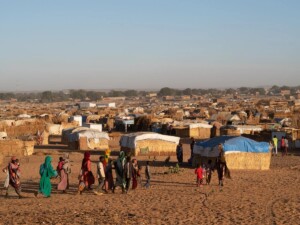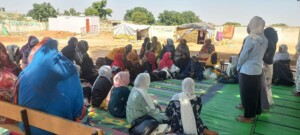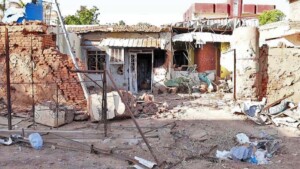Sudanese refugees in Chad face dire water shortages
Sudan Media Forum – Joint News Room
By Ayin Network
Aisha Adam Ishag survived the massacres that took place in El Geneina, the capital of West Darfur, at the beginning of the war between the Sudanese Armed Forces (SAF) and the Rapid Support Forces (RSF). A harsh asylum journey brought her to refugee camps in eastern Chad, only to find herself facing a more tragic reality where the most basic necessities of life, including drinking water, are absent.
Aisha suffers greatly in accessing safe drinking water. She receives around 60 litres as her daily ration in the camp, barely sufficient to cover her basic needs. This forces her and other refugee women to fetch water from sewers and valleys, which is unfit for drinking and has a noticeable change in colour and smell, she recounts in a video interview with Ayin Network.
Aisha currently resides in the Tongori camp in eastern Chad, after being forcibly relocated by the Chadian authorities along with new refugees who arrived from Sudan after the April 15th war. She was previously sheltered in the Adré camp, which is relatively close to basic services such as drinking water sources and medical centres, according to the refugees.
Thousands thirsty
Adré camp in eastern Chad used to shelter thousands of Sudanese refugees who fled the Darfur region after the outbreak of the war in 2003 between the government of ousted President Omar Al Bashir and local armed movements.
It received thousands more after the outbreak of fighting in mid-April 2023, leading to an expansion of the camp. Friction arose between the refugees and locals who demanded their evacuation from their lands, claiming they wanted to cultivate them.
Against the backdrop of these tensions, the Chadian authorities decided to relocate the new Sudanese refugees to the recently opened Tongori camp, which is in a remote area far from basic services. The refugees had refused to go there due to their concerns about basic services and security, but say the authorities forcibly relocated them anyway.
Aisha told Ayin that there is a severe drinking water crisis in Tongori camp. On several occasions, water has caused friction between refugees and host communities, amid a complete absence of humanitarian organisations whose presence is necessary to provide food and water to refugees.
“Refugees are forced to go to the valley, a watercourse, to fetch water even though it is not drinkable and is polluted, and causes diseases, especially for children. Women walk long distances on foot to reach the valley to fetch water, carrying their children on their backs, due to the lack of options,” she says.
Extended suffering
For her part, refugee Fatima Adam Idris tells Ayin Network that “Tongori camp is witnessing a complete lack of services. We have spent 12 months in the camp carrying water on our heads and we cannot bear more than that. The absence of livestock has also contributed to our suffering. We need water, food, blankets, and clothes, especially since we are in the winter season.”
While refugee Amira Mostafa indicates that life in the Tongori camp is not very bad, the only problem that worries them is the lack of safe drinking water.
In an interview with Ayin Network, she says, “We go to the valley because its water is better compared to the groundwater that is extracted by pipes from the ground. We often receive aid from our relatives due to its absence in the camp.”
Chad shelters more than 600,000 Sudanese refugees who arrived after the 2003 war in Darfur and mid-April 2023, according to the United Nations High Commissioner for Refugees (UNHCR), which recently launched an appeal to save the situation of refugees in camps in eastern Chad, which it said has reached a critical stage.
This report is published simultaneously on the platforms of media institutions, organisations, and newspapers that are members of the Sudan Media Forum.
#SilenceKills, #NoTimeToWasteForSudan, #StandWithSudan.












 and then
and then